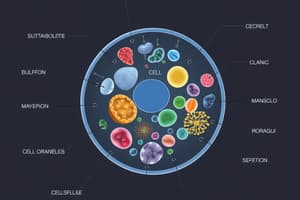Podcast
Questions and Answers
Which of the following is not part of the endomembrane system?
Which of the following is not part of the endomembrane system?
- Lysosomes
- Endoplasmic reticulum
- Golgi apparatus
- Mitochondria (correct)
What is the primary function of the cytoplasm in a cell?
What is the primary function of the cytoplasm in a cell?
- To carry out essential metabolic functions (correct)
- To provide structural support for the cell
- To contain the nucleus
- To produce energy through cellular respiration
What is the primary function of mitochondria in a cell?
What is the primary function of mitochondria in a cell?
- To capture sunlight and convert it into chemical energy
- To produce energy through cellular respiration (correct)
- To facilitate the movement of molecules across the cell membrane
- To synthesize proteins and other biological molecules
What is the main function of chloroplasts in plant and algal cells?
What is the main function of chloroplasts in plant and algal cells?
Which of the following transport mechanisms does not require energy?
Which of the following transport mechanisms does not require energy?
What is the central tenet of the cell theory?
What is the central tenet of the cell theory?
Which organelle is responsible for regulating cellular processes such as growth and reproduction?
Which organelle is responsible for regulating cellular processes such as growth and reproduction?
What is the primary function of the plasma membrane?
What is the primary function of the plasma membrane?
Which statement is true about cell biology?
Which statement is true about cell biology?
Which organelle is known as the 'powerhouse' of the cell?
Which organelle is known as the 'powerhouse' of the cell?
Flashcards are hidden until you start studying
Study Notes
Cell Biology in General Biology 1
Cell biology is a fundamental part of general biology, covering the structure, function, and organization of cells in living organisms. Understanding cell biology is crucial because it lays the groundwork for understanding the basic principles of life and the processes that occur within and between cells.
Cell Theory
Central to cell biology is the cell theory, which postulates that:
- All living organisms are composed of one or more cells.
- The cell is the basic unit of life.
- All cells arise from pre-existing cells by dividing.
These tenets provide a framework for studying cells and their behaviors, enabling scientists to investigate various aspects of cellular structure and function.
Cell Structures and Organelles
A cell's internal organization is governed by its organelles, specialized structures designed to perform specific roles in maintaining cellular homeostasis. Some key organelles include:
Plasma Membrane
The plasma membrane serves as the boundary between the cell interior and the external environment. It controls the movement of materials in and out of the cell and helps maintain cell shape.
Nucleus
The nucleus houses an organism's genetic material and is responsible for regulating cellular processes such as growth and reproduction.
Cytoplasm
The cytoplasm is the fluid-filled region surrounding the nucleus, containing various organelles and carrying out essential metabolic functions.
Endomembranes
The endomembrane system consists of three main structures: the endoplasmic reticulum, Golgi apparatus, and lysosomes. These organelles are involved in protein synthesis, lipid production, and waste disposal within the cell.
Mitochondria
Also known as the powerhouse of the cell, mitochondria produce energy through a process called cellular respiration, converting nutrients into usable energy.
Chloroplasts
Chloroplasts are present in plant and algal cells, responsible for capturing sunlight and converting it into chemical energy through photosynthesis.
Cellular Transport Mechanisms
Cells rely on various transport mechanisms to move molecules across their membranes, ensuring the proper functioning of cellular processes. These include:
Passive Transport
Passive transport does not require energy and allows molecules to move from an area of high concentration to an area of low concentration. Examples include diffusion and osmosis.
Active Transport
Active transport requires energy and is the selective movement of molecules against their concentration gradient. This process occurs in the presence of carrier proteins, which use energy from the cell to facilitate transport.
Facilitated Diffusion
Facilitated diffusion is a type of passive transport that uses carrier proteins to move molecules across the membrane. Unlike active transport, it does not require energy and occurs down the concentration gradient.
Vesicular Transport
Vesicular transport involves the enclosure of molecules or organelles within vesicles, which then move to their destination within the cell through a process called exocytosis or endocytosis.
Biological Molecules
Cell biology also investigates the various biological molecules that make up cells, including proteins, carbohydrates, lipids, nucleic acids, and other small molecules involved in intracellular communication and metabolism. Understanding these molecules and their interactions helps elucidate how cells function and respond to environmental stimuli.
By studying cell biology, we gain insights into the fundamental processes that govern life at the cellular level. This knowledge is essential for understanding more complex biological systems and developing new technologies that can improve our lives.
Studying That Suits You
Use AI to generate personalized quizzes and flashcards to suit your learning preferences.



